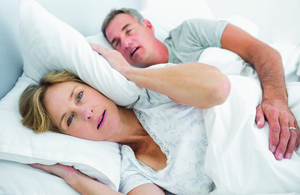Snoring and sleep apnea
3/25/2021 by Denise Dupras, M.D.

Many people snore, but snoring also can be a sign of a serious condition known as obstructive sleep apnea. So when is it time to be concerned and contact your provider?
Sleep apnea is a condition where breathing repeatedly starts and stops. While it can be caused by a failure of the brain to tell the muscles to work (central sleep apnea), the more common cause is obstructive sleep apnea (OSA).
Symptoms of OSA include:
- Loud snoring, enough to bother a bed partner
- Excessive sleepiness during the day, including falling asleep while driving, watching TV or working
- Stopping breathing during sleep, which is usually noticed by a bed partner
- Waking suddenly during the night with a gasping or choking sensation
- Morning headaches
- Problems with sleeping, including frequent awakening and difficulty falling or staying asleep
- Waking with a dry mouth or sore throat
Factors that increase the risk of OSA:
- Age over 50
- Excess weight
- Thick neck
- Men or postmenopausal women
- Chronic nasal congestion
- Smoking
- High blood pressure
- Narrowed airway
Untreated OSA can increase a person's risk of car accidents, heart problems (including hear attacks and heart failure), high blood pressure, stroke, and complications after general anesthesia. It also may affect performance at work or in school.
Initial evaluation will include getting a history about sleep patterns and information from a bed partner. A physical examination will focus on your blood pressure, weight, heart, lungs, mouth and neck. Questionnaires are very helpful to assess your risk and need for additional testing. One of the most common questionnaires is the STOP-Bang, which can be used to screen patients and determine if additional testing is needed.
Treatment for OSA depends on the severity of the condition, but generally will include avoiding sedating medications, alcohol and weight loss if you're overweight. If it occurs when sleeping in certain positions, avoiding those positions at night may be enough. It also may include the use of devices, such as a CPAP, that can improve the quality and quantity of your sleep.
If you or your bed partner are bothered by your snoring, contact your primary care provider for a discussion and evaluation.
Denise Dupras, M.D., Ph.D., is a general internal medicine physician in the Division of Community Internal Medicine at Mayo Clinic in Rochester, Minnesota. She completed her medical and doctoral degrees at Mayo Clinic Alix School of Medicine, and her residency in internal medicine at Mayo Clinic in Rochester. Her interests include medical education and evidence-based medicine.
